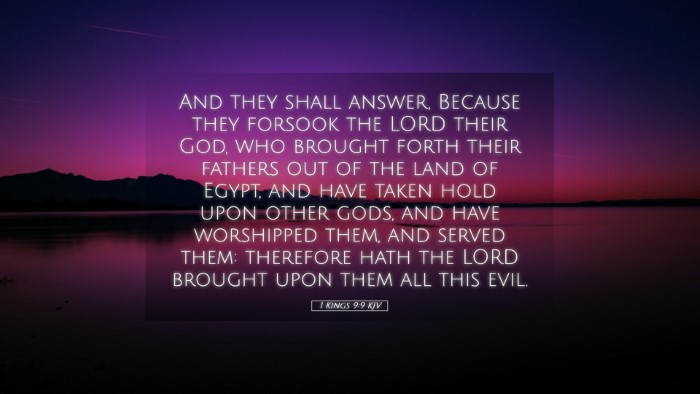Commentary on 1 Kings 9:9
The verse under consideration, 1 Kings 9:9, presents a critical moment in the narrative of Israel's history regarding God's covenant with His people and the consequences of their fidelity or infidelity to that covenant. This commentary draws insights from renowned public domain commentaries including those of Matthew Henry, Albert Barnes, and Adam Clarke to provide a comprehensive understanding of this scripture.
Contextual Overview
The broader context of 1 Kings 9 revolves around the Dedication of Solomon's Temple and God's covenant promises to Solomon. Following the completion of the temple, God appears to Solomon, reiterating His promise to bless Israel but also warning of the dire consequences of disobedience. This verse serves as a pivotal link between God's faithfulness and Israel's continued obedience.
Verse Analysis
1 Kings 9:9 states, "And they shall answer, Because they forsook the LORD their God, who brought forth their fathers out of the land of Egypt, and have taken hold upon other gods, and have worshipped them, and served them: therefore hath the LORD brought upon them all this evil." This verse highlights several key theological themes:
-
Forsaking God: The verse unequivocally asserts that the abandonment of the Lord leads to profound consequences. The phrase "forsook the LORD their God" indicates a deliberate turning away from the covenant relationship established by God with Israel.
-
Historical Remembrance: The reference to God's deliverance from Egypt serves as a reminder of His saving power and faithfulness. This historical context emphasizes the gravity of Israel's rebellion against such a merciful God.
-
Theological Consequence: The worship of other gods is condemned, illustrating the core biblical principle regarding idolatry and its repercussions—aligning one's self with false deities invites judgment and "all this evil."
Theological Implications
Drawing from Matthew Henry's commentary, it is clear that the relationship between God and His people is covenantal, and thus when Israel forsakes God, they not only suffer physical calamities but also spiritual desolation. Henry emphasizes the seriousness of idolatry, which is viewed not merely as a failure to worship God but as a profound breach of trust.
Albert Barnes highlights the interplay of justice and mercy within God's judgment. The consequences faced by Israel after turning to idolatry are not simply punitive but reflect the righteous response of God to human disobedience. His providence maintains order and holiness among His people.
Adam Clarke elaborates that these divine responses serve both as a warning and a lesson aimed at future generations. The remembrance of God's past acts of salvation from Egypt juxtaposes the current state of Israel. Clarke further notes that their failure to recognize God's enduring goodness leads them toward their own destruction—a critical reminder for believers today.
Pastoral Applications
For pastors and church leaders, the truths found in 1 Kings 9:9 serve as vital lessons for congregational life. The ability to remember God's faithfulness is paramount. The theological implications of this scripture underscore the importance of teaching about God's historical acts of deliverance, fostering a community that honors and worships Him above all.
The warning against idolatry echoes throughout scripture. Modern applications might encompass not only traditional forms of idolatry but also contemporary distractions that vie for believers’ attention. Thus, pastoral care should encompass guidance on remaining steadfast in faith amidst cultural pressures that detract from God’s glory.
Conclusion
In summary, 1 Kings 9:9 provides an essential commentary on the relationship between Israel and God through the lens of covenant fidelity. The insights from public domain commentaries remind us of the dire consequences of forsaking God, the criticality of remembering His gracious acts toward us, and the necessity of worshiping Him alone. The collective voice of Henry, Barnes, and Clarke encourages a reflective engagement with the text, prompting believers to examine their own hearts and the civic identity of the church. The lessons drawn not only speak to the historical context of ancient Israel but also resonate with the present-day challenges faced by the body of Christ.


